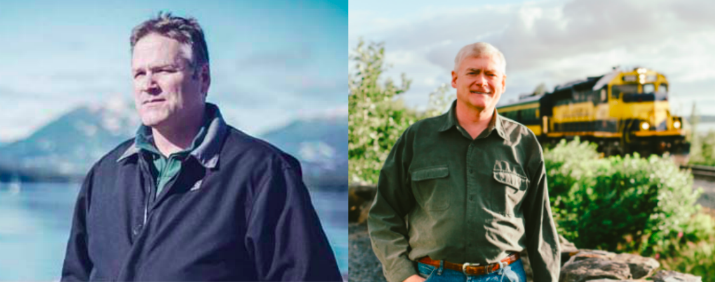SPIRITED EXCHANGE KEPT AUDIENCE RIVETED
Beyond differing styles of the candidates, gubernatorial hopefuls Mike Dunleavy and Mead Treadwell agreed on much during their latest debate on Thursday evening in Anchorage.
They both agreed that SB 91 needs to be repealed and that crime is one of their top priorities. They somewhat agreed on how the Permanent Fund dividend should be calculated (Dunleavy favors original formula, Treadwell goes with POMV, Dunleavy favors putting it in the Alaska Constitution, Treadwell does not).
They agreed on the “3 percent for Native Corporations out of the oil that will come from the Arctic National Wildlife Refuge,” honoring the agreements made with Alaska Natives during ANILCA, which Treadwell explained in solid detail, showcasing his deep knowledge of the subject.
However, they did not agree with Treadwell’s statements that Dunleavy wasn’t the best candidate for the job.
The two took a couple of indirect shots at each other during the Anchorage Republican Women’s Club’s “Visions for Victory” debate in the conference room of Davis Constructors.
How each responded under pressure revealed how prepared they were for the criticism that will come after the Aug. 21 Primary Election: Treadwell gesticulated and was frustrated by the time limits set by the moderator; Dunleavy was composed, nonchalant, and left no opening for future attacks from Treadwell, who has attacked him in campaign materials and radio spots.
But Treadwell also said he had supported Dunleavy for Senate, and was proud of doing so.
Treadwell, when it was time to ask his own pointed questions of his opponent, asked Dunleavy to explain a complicated high-stakes financial deal that Dunleavy’s Texas brother had been a part of, which Treadwell said raised electrical rates in California, and the other parts of the question were to ask Dunleavy if he agreed with his brother, and what Dunleavy do would do to lower electrical rates in Alaska. Dunleavy had 60 seconds to answer that.
Dunleavy lobbed back a rhetorical missile, saying this was the Treadwell voters had come to expect, and he (Dunleavy) would not go after Treadwell’s family in this debate.
Later, when it was his turn to ask a question, he asked Treadwell to repeat Reagan’s 11th Commandment, which Treadwell did, paraphrasing it satisfactorily. It is this: “Thou shalt not speak ill of any fellow Republican.”
Dunleavy was driving home the point about negative campaigning. He asked him to repeat it again.
Dunleavy asked Treadwell to explain why, when he was lieutenant governor, he allowed the hybrid ticket of Bill Walker and Byron Mallott to go forward to the general election, even though the Democrat voters had duly elected Mallott as their nominee. Treadwell would have 60 seconds to answer that.
Treadwell answered that he felt Walker and Mallott deserved due process and that he was leaning on three other instances in Alaska history when making his decision. He said he consulted with the attorney general for three hours, and he expected some external entity representing Republicans to sue over it, but a lawsuit never materialized.
The crowd of about 70 seemed to enjoy the exchange, which drew camera crews from the Anchorage Daily News, KTVA and KTUU, although most media left before the gubernatorial segment began.
Moderated by Bernadette Wilson, the evening also included major candidates for lieutenant governor, who agreed on nearly everything (“save the PFD” and “repeal SB 91”).
During the lieutenant governor segment, the four candidates avoided attacking each other and at times it was somewhat of a love-fest, with each simply touting his or her own experience, not criticizing the others.
Sen. Kevin Meyer spoke directly to the multiple problems identified in the Division of Elections, including the issuing of double ballots to Democrats in Shungnak (allowing them to vote one Republican ballot and one Democrat ballot during the primary), lost ballots, and now, the overwriting of addresses in the Election Division’s database with addresses provided by the Permanent Fund Division, which has moved many Alaskans into the wrong voting districts.
[Read: Division of Elections has moved hundreds of voters to new districts]
Sharon Jackson rebutted a question posed about whether the state should try to get a higher voter turnout, at the expense of getting an informed turnout. Jackson wanted to make it clear that she feels it’s not up to the state to determine who is intelligent.
Retired Col. Edie Grunwald pointed to her experience in the Alaska National Guard, and former Rep. Lynn Gattis drew upon her lifelong experience in rural Alaska, and her time in the Legislature, and how that gives her a perspective none of the others has.
The candidate-to-candidate questions between the lieutenant governor hopefuls were purely softball, reflecting the camaraderie that has developed between them on the campaign trail.
